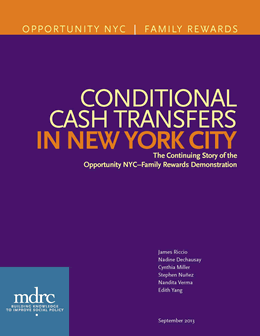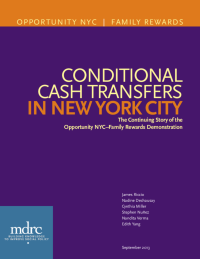Research Results Used to Develop New Conditional Cash Transfer Model in NYC and Memphis
Conditional Cash Transfers in New York City
The Continuing Story of the Opportunity NYC−Family Rewards Demonstration

Opportunity NYC–Family Rewards, an experimental, privately funded, conditional cash transfer (CCT) program to help families break the cycle of poverty, was the first comprehensive CCT program in a developed country. Launched in 2007 by New York City’s Center for Economic Opportunity (CEO), Family Rewards offered cash assistance to low-income families to reduce immediate hardship, but conditioned that assistance on families’ efforts to build up their “human capital” to reduce the risk of longer-term and second-generation poverty. The program thus tied cash rewards to pre-specified activities and outcomes in children’s education, families’ preventive health care, and parents’ employment. It operated as a pilot program for three years, concluding, as planned, in August 2010.
Six community-based organizations, in partnership with a lead nonprofit agency, ran Family Rewards in six of New York City’s highest-poverty communities. MDRC is evaluating the program through a randomized control trial involving approximately 4,800 families and 11,000 children, half of whom could receive the cash rewards if they met the required conditions, and half who were assigned to a control group that could not receive the rewards. This report presents final results on the experience of operating the program and interim findings on its effects on a wide range of outcomes three to four years after participants entered the program. Future reports will present longer-term findings.
Key Findings
Family Rewards transferred over $8,700, on average, to families during the three-year period. As of spring 2013, it had had some positive effects on some outcomes, but left other outcomes unchanged. For example, the program:
- Reduced current poverty and material hardship, including hunger and some housing-related hardships, although those effects weakened after the cash transfers ended
- Helped parents increase savings and reduce reliance on families and friends for cash loans
- Did not improve school outcomes overall for elementary or middle school students, perhaps in part because, for these children, the program rewarded attendance (which was already high) and standardized test scores (rather than more immediate performance such as good report card grades)
- Had few effects on school outcomes for high school students overall, but substantially increased graduation rates and other outcomes for students who entered high school as proficient readers
- Did not increase families’ use of preventive medical care, which was already high, and had few effects on health outcomes
- Substantially increased families’ receipt of preventive dental care
- Increased the likelihood of self-reported full-time employment but did not increase employment in or earnings from jobs covered by the unemployment insurance system.
Building on the early evidence that is emerging from this evaluation, MDRC and CEO have revised the Family Rewards model considerably, and MDRC is now testing that new version in Memphis, Tennessee, and the Bronx, New York, in a separate demonstration project.






